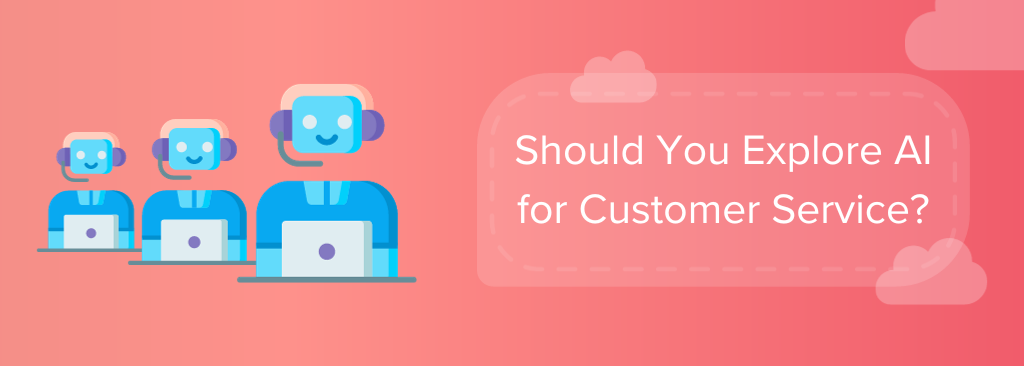Should You Explore Artificial Intelligence for Customer Service?
I was first exposed to Artificial Intelligence (AI) when I saw the 1999 movie Bicentennial Man, starring Robin Williams.
In the film’s opening scenes, a cyborg takes on the role of a butler within a well-to-do family’s household, immediately displaying a distinctive and unconventional personality.
The movie unfolds as it delves into the life of its central character, an android acquired by the family to serve as a domestic robot, primarily tasked with mundane chores.
However, the family soon realizes that their new acquisition is far from an ordinary robot, as the android, named Andrew, begins to exhibit emotions and showcases creative thinking.
Spanning two centuries, the story chronicles Andrew’s profound journey of self-discovery, where he grapples with the complexities of humanity, life, and love.
I was fascinated by the movie, and I always wondered if this would ever become a reality. We are close to getting there, with generative and conversational AI mimicking everything humans do.
Today, AI has become a staple in most business activities, especially those concerning customer service.
AI in Customer Service – The Context
AI-assisted customer service strategy is the easiest way to deliver personalized experiences that drives deeper conversations and relationship.
AI-assisted customer service combined with cloud-based contact center platforms ensures that the agents can quickly respond to every customer query without sacrificing the quality of service at any stage.
Speed and quality of service are the two key attributes that customers love in customer service.
According to Salesforce’s “State of Connected Customer Report,’ 72% of customers stay loyal to an organization that provides faster service. It also found a correlation between using AI technologies, such as Generative AI, and customer sentiments that influence sales, service, and support behavior.
What Does AI in Customer Service Mean to You?
AI in customer service encompasses technology, including machine learning, natural language processing, and data analytics, to enhance and automate various aspects of customer experiences.
Often, people implement AI without giving it much thought, resulting in more headaches than solutions.
Is it about the wait times?
Is it about the CSAT and NPS scores?
Is it about reducing the churn rate within your customer service department?
It is much more than that.
You must consider whether AI would help reduce your customer’s frustrations or escalate the problems.
What you truly need are fast, actionable, and trustworthy responses based on your customer’s needs and wants.
The most common examples are chatbots and virtual assistants, which can handle nearly 90% of your customer needs. With generative AI, Natural Language Processing (NLP), and voice search, chatbots have seen a remarkable improvement in their self-learning capabilities, resulting in better decision-making for an improved quality of service.
Check out our blog on : How NLP helps enhance customer service
How Does AI Benefit Organizations in Customer Service?
Here are six ways AI helps provide personalized and responsive services to your customers faster and better.
1. Automation
Chatbots and virtual assistants can handle routine inquiries, tasks, and processes, allowing human agents to focus on more complex and value-added customer interactions. This is the 90% that I wrote about earlier.
It streamlines workflows by automating repetitive tasks, reducing response times, and increasing the overall efficiency of customer service operations.
2. Personalization
A substantial amount of Amazon’s business comes from its recommendation engines, and Netflix’s loyalty is also due to personalized recommendations.
They are leaders in their respective spaces mainly because of the personalization they offer.
These are the doings of AI that analyze customer data to deliver tailored recommendations, responses, and experiences, making customers feel understood and valued.
3. Predictive Analytics and Insights
AI can help predict customer needs, behaviors, and potential issues, allowing you to proactively address issues and offer solutions before customers even realize they have a problem.
Besides, AI helps you analyze vast amounts of customer data to uncover trends, patterns, and insights that can help you make informed decisions, product improvements, and service enhancements.
4. 24×7 Availability
How often have you heard customers feel happy about 24×7 customer service?
They love it absolutely. How would you feel when you offer it without human intervention?
AI can help you provide round-the-clock support, ensuring customers get assistance anytime and enhancing customer satisfaction and loyalty.
5. Natural Language Processing (NLP)
Chatbots and Virtual Assistants with NLP allow you to understand and respond to customer queries in natural language, improving the quality of interactions.
Check this blog on : How NLP platform revolutionize customer Service.
6. Scalability
AI allows organizations to scale their customer service rapidly, adapting to changing demands without the need for extensive hiring and training.
Overall, AI in customer service helps you create a seamless and customer-centric experience by combining technology and human expertise to meet and exceed customer expectations.
AI can power your customer service positively, making it easy for your agents and customers.
